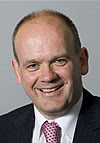
Today's Assembly questioned witnesses from the Olympic Park Legacy Company - Baroness Ford, the chair, formerly of English Partnerships, and chief executive Andrew Altman, formerly deputy mayor of Philadelphia. They are a class act but running the company that will take on responsibility for the site after 2010, they will need to be.
They identified two primary challenges facing their organisation. First, ensuring that the project continued to be a government priority even after the games are over and the excitement has faded. Second, managing land deals with competitive partners in an uncertain property market.
Baroness Ford confirmed that they have priced the post Olympic work at £450 million, including letting out a media centre that covers a larger area than Canary Wharf. Kit Malthouse warned that a not for profit venture should not become a we need more money project.
Olympic Stadium
Murad Qureshi told us that the Moscow Olympic Stadium had stood unused for 28 years after the games. The inclusion of an athletics track potentially made the facility unattractive for other users, particularly football clubs who want fans to be seated as close to the pitch as possible. The witnesses confirmed that following the games, 55,000 seats would be removed at a cost of £36 million, to create a smaller, more viable venue. The athletics element would remain however, as this was a commitment entered into when the games were awarded to London.
Debt
The witnesses said that they did not expect any additional debt to be transferred to their company. They would be applying for outline planning permission to develop the site in the coming twelve months, after which they would seek bids from development partners.
Remediation
The entire site has been decontaminated to a depth of 31 inches. Much of the area was home to some pretty noxious industries so a lot of nasties were taken away. Jenny Jones wondered if the ground would be safe for growing vegetables. This is potentially a problem for fruit trees with deep roots but smaller plants will be safe. Radioactive carrots will not be bathing the stadium in a luminous glow - unless they grow longer than 31 inches...
They identified two primary challenges facing their organisation. First, ensuring that the project continued to be a government priority even after the games are over and the excitement has faded. Second, managing land deals with competitive partners in an uncertain property market.
Baroness Ford confirmed that they have priced the post Olympic work at £450 million, including letting out a media centre that covers a larger area than Canary Wharf. Kit Malthouse warned that a not for profit venture should not become a we need more money project.
Olympic Stadium
Murad Qureshi told us that the Moscow Olympic Stadium had stood unused for 28 years after the games. The inclusion of an athletics track potentially made the facility unattractive for other users, particularly football clubs who want fans to be seated as close to the pitch as possible. The witnesses confirmed that following the games, 55,000 seats would be removed at a cost of £36 million, to create a smaller, more viable venue. The athletics element would remain however, as this was a commitment entered into when the games were awarded to London.
Debt
The witnesses said that they did not expect any additional debt to be transferred to their company. They would be applying for outline planning permission to develop the site in the coming twelve months, after which they would seek bids from development partners.
Remediation
The entire site has been decontaminated to a depth of 31 inches. Much of the area was home to some pretty noxious industries so a lot of nasties were taken away. Jenny Jones wondered if the ground would be safe for growing vegetables. This is potentially a problem for fruit trees with deep roots but smaller plants will be safe. Radioactive carrots will not be bathing the stadium in a luminous glow - unless they grow longer than 31 inches...


